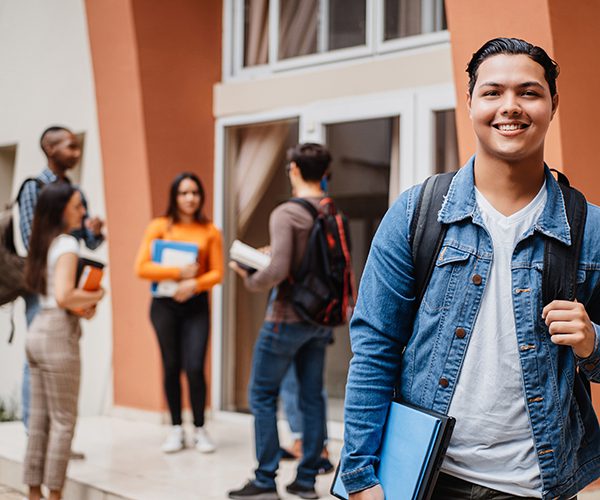How Colleges Can Better Support Undocumented Students in the Aftermath of the Affirmative Action Ban
Here are some recommendations on how colleges can better support undocumented students in the wake of the affirmative action ban and remove barriers that often deter these students from obtaining a postsecondary degree.

November 17, 2023 by
Jaime Ramirez-Mendoza
Racial inequity is baked into the higher education system, but the Supreme Court’s decision to ban affirmative action means colleges can no longer consider race as one of many factors when evaluating a student’s potential admission. Many worry that racial diversity on college campuses will plummet, as it has in states like California and Michigan that banned race-conscious admissions. And despite concerted efforts to expand outreach and use class-conscious admissions policies to reduce the racial gaps in enrollment, many universities in those states are struggling to expand access and meet their diversity goals.
The ban could hurt students of color, including many undocumented students who already must navigate an inequitable education system that shortchanges them of resources and forces them to traverse a complex web of federal, state, and institutional policies that often prevent them from applying to college, financial aid, and feeling safe on campus. About 1 in every 50 students enrolled in college is undocumented, and nearly 83% of them are students of color.
The ban is also shortsighted, as it won’t change the fact that our nation is becoming increasingly diverse, many jobs now require a postsecondary education, and states cannot afford to exclude students of color if they want to maintain a strong economy.
However, as Liliana M. Garces — the W.K. Kellogg Professor in Community College Leadership at the University of Texas at Austin — notes in a recent blog post, the court can issue a decision, but it can’t implement it. That responsibility falls heavily on college educators and administrators, whose interpretation and implementation of the decision will play a major role in how universities expand access and foster student diversity on campuses. With all of this in mind, here are some recommendations on how colleges can better support undocumented students in the wake of the affirmative action ban and remove barriers that often deter these students from obtaining a postsecondary degree.
Make the Application and Admissions Process More Welcoming for Undocumented Students
Students applying to college are often asked a variety of questions, including what their high school GPA is, what major they intend to pursue, whether their parents are U.S. citizens, and what their Social Security number is.
These are harmless, easy-to-answer questions for some applicants. But for students who may be worried about revealing their undocumented status, such questions put them in a bind: Reveal that they are undocumented or refuse to submit their information to protect their status.
Students who are citizens but have undocumented parents may also be reluctant to complete an application out of fear of putting their family at risk for deportation.
In fact, the fear of revealing their immigration status or that of a family member can be so great that some undocumented students who reside in states that offer them in-state tuition would rather pay out-of-state tuition than disclose their status.
Higher education leaders should, therefore, consider removing questions about citizenship status and family background from applications or making them optional, lest they deter undocumented students from applying or seed feelings of anxiety and isolation.
Barring that, since admissions officers are often the first point of contact between students and institutions, they should explain as early as possible to students why such questions are asked and remind them that colleges are required by law to keep their status confidential. Admissions officers should also be aware of existing resources and supports for undocumented students so they can help them complete both their college application and onboarding process.
Expand Access to Financial Aid and Employment Opportunities for Undocumented Students
Even after they’re admitted, undocumented students must navigate multiple federal, state, and institutional financial aid policies that often make college unaffordable for them.
All undocumented students — including Deferred Action for Childhood Arrivals (DACA) program participants — are disqualified from receiving any federal financial aid for college, which includes the Pell Grant and federal work-study. In addition, undocumented students often have limited access to in-state tuition and aid; in fact, only 17 states and D.C. grant both benefits.
To make matters worse, many institutions classify undocumented students as international students — even if they grew up in the U.S. and graduated from a U.S. high school. As a result, many undocumented students are charged out-of-state tuition rates — which are, on average, nearly three times higher than in-state tuition rates — and denied access to institutional scholarships that domestic students are eligible for.
Institutions can and should make tuition rates more affordable for these students by (re)classifying undocumented students as domestic applicants and revamping scholarship policies so that only pertinent applicant information is collected.
Unfortunately, even when undocumented students are correctly classified as domestic applicants and have access to in-state resources, they don’t always get accurate information about their financial aid options. For instance, a study by the California Student Aid Commission (CSAC) found that undocumented students in California — especially those in high school — often get minimal or contradictory guidance on financial aid options and processes, and that information sessions predominately centered on the FAFSA, with little attention given to the state financial aid application that undocumented students fill out to see if they’re eligible for state aid. The same thing can also happen on college campuses that lack the cross-department coordination needed to meet the specific needs of and resources for undocumented students.
With these barriers in mind, institutions should increase and streamline coordination between campus departments and create a student advisory board to ensure that staff members are up-to-date on campus resources, financial aid options, and alternatives for undocumented students — like TheDream.US Opportunity scholarship and interstate agreements, which give undocumented students access to discounted tuition in certain participating states. Colleges can also help undocumented students pay for college by creating paid fellowships, internships, and other experiential opportunities for them. By implementing these practices, universities gain the necessary infrastructure and information to guide undocumented students toward viable grant, job, and entrepreneurial opportunities, all while identifying systemic barriers that deter them from seeking vital financial resources or make it exponentially harder for many to access, work and pay for college, and graduate.
Provide Additional Supports to Undocumented Students
The Supreme Court’s affirmative action ban means that colleges have lost a key tool to fight racial injustice in higher education. What’s more, the ruling could cause confusion about admissions procedures going forward and lead university administrators to overcorrect in the ruling’s aftermath, out of a fear of legal action. It could also have ripple effects on equity-focused policies beyond admissions — this already seems to be happening — which would be devastating for undocumented students, who face significant barriers in applying and affording college.
Now more than ever, institutions must make a concerted effort to improve access and affordability for undocumented students and ensure their success. However, altering admissions and financial aid policies to ensure students feel comfortable applying is only a start.
A recent report by The Education Trust calls on institutional leaders to support undocumented students by creating student centers that deliver wrap-around services to undocumented students, provide free legal services, and hire campus liaisons focused on meeting their needs. It also highlights key ways that federal and state policymakers can center equity and holistically support undocumented students pursuing a college degree — including creating a pathway to citizenship, updating policies to allow undocumented individuals to access federal and state public benefits, and prohibiting universities from cooperating with immigration authorities.
As states and universities recalibrate in the wake of the affirmative action ban, policymakers and institutional leaders must build on existing efforts to more equitably serve undocumented students before and during the college application process and throughout college.
Jaime Ramirez-Mendoza (he/him) is a first-generation, low-income, Latino Ph.D. student in the School Organization and Education Policy program at the University of California – Davis School of Education. His research focuses on racial equity and examines how college affordability impacts access and success for historically excluded populations.
Related
By collaborating with ICE, universities are not only abdicating their responsibility but also contributing to an environment of fear, uncertainty, and victimization

March 19, 2025 by
Sayda Martinez-Alvarado
Amid ICE raids on college campuses, immigrant and undocumented students are living in fear for themselves and family members
Trump’s executive order on immigration and rescinding protected areas have created fear among undocumented students






